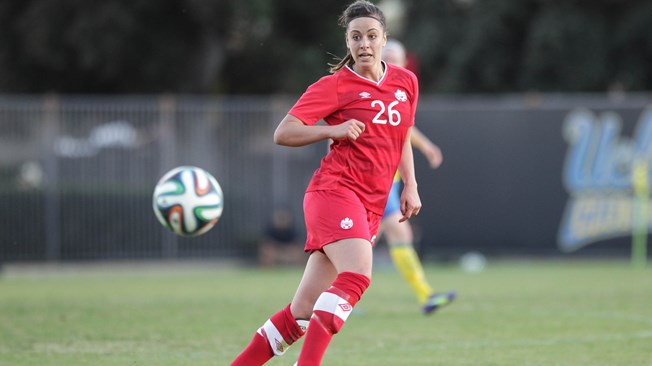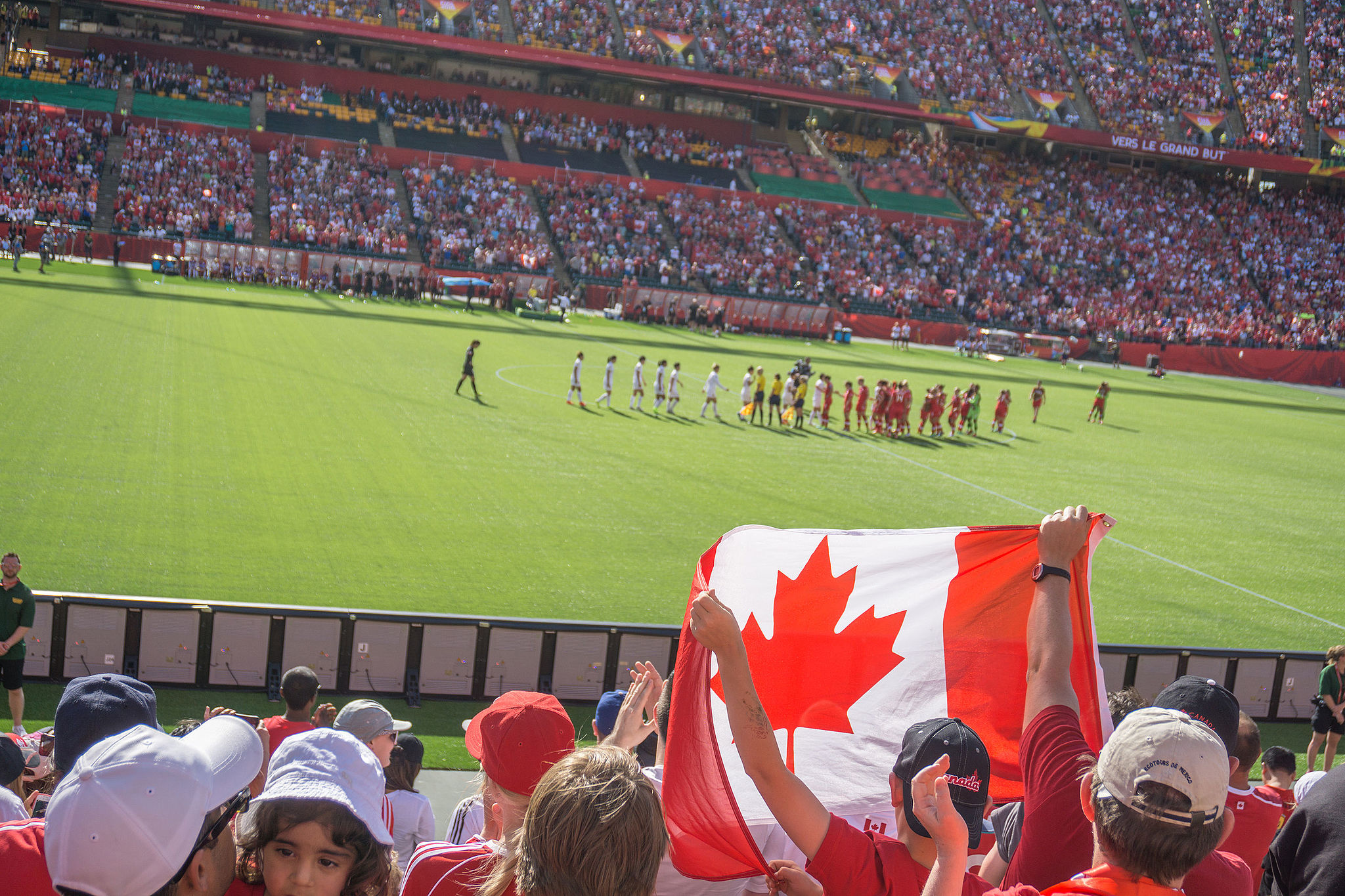
UAlberta physical therapy alumna Selenia Iacchelli's capped an injury riddled career by making Team Canada's roster for the FIFA Women's World Cup. (Photo courtesy FIFA)
(Edmonton) It was a spectacle to behold: more than 50,000 fans, decked out in maple leaf red, channelling the enthusiasm of an entire nation as Team Canada prepared for its first match in the FIFA Women's World Cup.
Canadian midfielder Selenia Iacchelli stood in awe, not just of the noise or size of the crowd, but at the mere fact she was there, representing her country. She had arrived-in her hometown no less.
"Coming back to Edmonton was surreal, it was a dream come true. I remember walking into Commonwealth Stadium and it was overwhelming," Iacchelli remembers of that first game, a 1-0 victory over China on June 6.
Just two years prior, solidifying a spot on Canada's FIFA Women's World Cup roster would have been unimaginable for the Edmonton native and alumna of the University of Alberta's physical therapy program.
Iacchelli, '12 MScPT, endured a succession of injuries that would have forced less spirited players to rethink their careers. But her heart always returned to her passion, often dragging the rest of her body along the way-willingly or not.
"I didn't think I would make the team. The months before I made it, I was just playing for passion and love of the game."
The long road to redemption
Iacchelli suffered the first of many injury setbacks on the pitch when she broke a bone in her foot during her senior year with the University of Nebraska Huskers, an injury that led to extended time away from the sport.
After graduating with an undergraduate degree in nutrition and exercise science, Iacchelli resumed her playing career, moving to Sardinia where she played professionally for a year before scar tissue in her foot led to another break. The injury also dashed any hope of representing her country on Team Canada.
Faced with another lengthy rehabilitation, Iacchelli decided to switch gears and return home to Edmonton where she enrolled in physical therapy at the U of A. Influenced by her own treatment over the years, the profession had always been a long-term goal and, with her body unable to play, the time was right.
"The U of A has one of the best physio programs in the country, so it was a dream come true when I got in."
For the next three years Iacchelli concentrated primarily on her studies but also played major league soccer with the Edmonton Victoria where she earned MVP honours for all of Alberta. That exposure got her noticed nationally and she was encouraged by Team Canada coach John Herdman to play professionally in Europe to hone her game.
"The U of A has one of the best physio programs in the country, so it was a dream come true when I got in." -Selenia Iacchelli
Iacchelli was a week away from joining a team in England when she tripped and fell into the boards during a pickup game, breaking her humerus. Despite yet another setback, she steeled herself for one more comeback and moved to Vancouver, Team Canada's home base, to rehab, train and prepare to land a spot at trials in September 2013.
Just when it felt like her body was ready to resume play, Iacchelli was drafted to play in Buffalo where she tore the lateral side of her patellar tendon. Looking back, she blames herself for pushing her body too hard too quickly after an extended layoff while pursuing her master's.
Being a trained physical therapist has obvious advantages when training for a comeback. Iacchelli says the knowledge she gained at the U of A helped get her back on the field quicker. Her injury experience also makes her a better physical therapist because she understands what athletes are going through.
"I can't say I'm the best patient for doing all my exercises and everything, but my experience has given me one of the biggest and best learnings as an athlete and a physio, at least for athletes that I treat," she says. "I feel like I know what they want. I treat patients the way I want to be treated, within reason of course."
Despite training for another comeback, Iacchelli's time away from the pitch and lack of playing time took its toll on her game. Around Christmas of 2014, Herdman delivered some "heartbreaking news": she was put on the wide roster, where she had little chance of playing for her country except in the case of injury.
Focus shifts to physical therapy career
Iacchelli started working full-time as a physical therapist in Vancouver, but even though she had changed careers her heart couldn't move on. She played the equivalent of major league soccer in her spare time; being cut did not extinguish her fire to compete.
"Even when John cut me, I knew I could be on the team," Iacchelli says. "I was always very positive about it. I just love to play soccer, love to play and want to play at the absolute highest level."
Life and work kept Iacchelli busy when out of the blue Herdman called and invited her to training camp in Cyprus. There were no injuries, just a straight invite to see what she could offer.
"I came out every day and played. There was no pressure and I'm not sure what happened but I played the best soccer of my life," she says. "We had a scrimmage, an intersquad, and John told me I was the best midfielder on the team."
Herdman has described Iacchelli's journey as a "great story of perseverance."
"Off the pitch, you can see the impact she has on her peers and teammates. She's someone who will definitely put her teammates first," Herdman said in an interview with Sportsnet. "On the pitch, she would come to these training sessions and at times, she was one of the best players there."
After the months and years of her body betraying her, Herdman called Iacchelli into his office for what she assumed would be a consolation speech when he put up her name on a slide on a projection screen and handed her a Team Canada jersey.
Iacchelli promptly broke down into tears.
"He said, 'Not only did you persevere and never give up, I've never seen this level of soccer from you before. Hands down, you deserve a spot on this team,'" she remembers.
The World Cup tournament and quarterfinal loss to England was not the storybook finish Iacchelli, her teammates or Canadian fans wanted; it took weeks to get over the "bitter pill" of losing to team Canada had "dominated" in exhibition play. But the fact Iacchelli was there at all, after setback after setback, showed an entire country she has the heart of a winner.
But more than her own victory, she's most proud of how the nation responded.
"The best part of the World Cup is what we did for our country and what we did for female soccer in our country. Men and women were inspired by us-and we were inspired by a nation."
As one of the older players on Team Canada and with many younger stars rising, Iacchelli's future with the team is unknown. Playing pro in Europe is another possibility, although that would mean uprooting and leaving the job she loves.
One thing is certain: the fire still burns.
"I don't want to retire from international soccer, but if that time has come what I do know is that I will never stop playing the game that I love so much."
